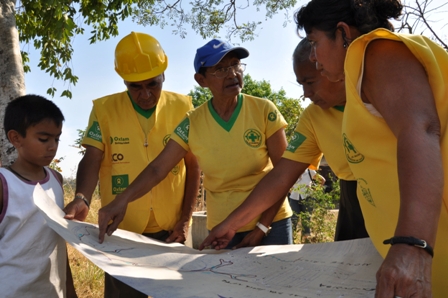An island in thin air

Elizabeth Stevens is just back from El Salvador, where she was visiting communities affected by severe flooding and landslides brought on by Hurricane Ida in November 2009.
“We didn’t expect this emergency, but we were prepared,” said Paula Deperla.
Deperla is a member of a disaster-response committee trained by Comandos de Salvamento, an Oxfam partner in El Salvador. When heavy rains pounded the region in November, her team swung into action, knocking on doors and calling in the local authorities to assist.
The losses were heavy: eight houses in their community were buried or badly damaged by landslides around the ravine, or barranco, that borders the neighborhood. It was thanks to the quick action of the committee that no one died.
Paula and her group led us down a steep hill to see the area that was most affected by the storm. The street was clean and wide at the top, paved with carefully laid stones and lined with sturdy houses of brick, concrete, and stucco. By the time we reached the bottom, rusty sheets of corrugated metal were standing in for many of the walls and roofs, and a steady stream of smelly gray water ran alongside the broken slabs of concrete that served as pavement.

The biggest shock happens when you step into one of these houses and out the other side. Take five or ten steps—fewer each year—and you find yourself on the edge of a cliff, a vertical drop of hundreds of feet that is lengthening with every earthquake and every pounding rainstorm. An entire neighborhood sits on a finger of land jutting out into thin air—buffered from disaster by just a few feet of loosening soil.
It would be hard to find a more dramatic example of how poverty places people in harm’s way.
“We have very few resources,” said Maria Julia Garcia, whose children and grandchildren live on the rim of the barranco, “so it is hard to relocate by our own means.”
From Comandos, the disaster-response committee had learned techniques—how to staunch a wound, how to get people out of their homes and into shelters. But in the course of all that training, they learned something more fundamental: how to take matters into their own hands.
“We were not waiting for City Hall to tell us to do this or do that,” said Deperla. “We just did it.”
The committee, with Comandos by its side, is pressuring the government to find those resources and relocate the families at risk.
“It is important that the programs of Comandos keep going because we need them,” said Deperla. “Because we don’t know what the future can bring.”